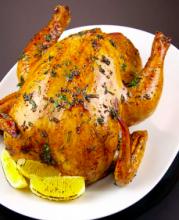When you have a small kitchen and you're only cooking for two but you are passionate about good food and cooking, there are times when it's a great deal of vicarious fun to watch other people cook, and other people eat. Yes, I'm talking about food pr0n—the Food Network, and all those cooking shows (and later, I'll even talk about food blogs) where people who know what they're doing make great food look simple, and good cooking a matter of following the steps that they make look so effortless.
Television cooking began, not too surprisingly, with commercials. Famous presenters, or even household name stars, would do very brief cooking demos on screen, live, for the programs's sponsors. It didn't take long for networks and local stations to realize cooking demos, and even cooking classes, worked fabulously well on TV.
In the 1960s, beginning in 1963, TV had Julia Child and The French Chef (you can still catch old episodes from the show's two year run on Educational TV/PBS as reruns on The Food Network). In 1969, American television audiences rejoiced in Graham Kerr as the Galloping Gourmet. Since Julia Child and Graham Kerr made gourmet cooking fun and repeatable, there's been a definite increase of highly produced, carefully executed television intended to appeal to casual as well as more dedicated cooks. At first, PBS and ETV were the primary production homes for cooking shows. The 1980s brought us the bizarre and annoying Jeff Smith as The Frugal Gourmet (he permanently earned my ire for making up etymologies, screwing with history—and allegedly, with his underage assistants). In the late 1980s and the 1990s TV brought us shows by Martha Stewart, who made frequent guest appearances on Oprah! and elsewhere, before launching her own show.
The 1990s and cable networks brought us The Food Network, with chefs like Mario Batali, Bobby Flay, Emeril Lagasse, and Alton Brown. The Food Network is also at least partially responsible for the television career of Anthony "Tony" Bourdain, first in A Cook's Tour for The Food Network, and then, with a slightly venomous relief, in 2005 on his own show No Reservations.
British chef and restauranteur Gordon Ramsay, already familiar to British audiences and cookbook readers came to Fox Television and America via his shows Hell's Kitchen in 2005 and Kitchen Nightmares in 2007. The same decade brought France's Eric Ripert's to American TV via both Tony Bourdain's No Reservations, and Bravo's Top Chef, starting in 2006. PBS began begun airing episodes of Rippert's Avec Eric in 2009. 2009 also brought us Meryl Streep and Stanley Tucci in Nora Ephron's Julie & Julia, a celebration of Julia Child, French cooking, and good food that has once again awakened interest in those first French Chef episodes, as well as Child's subsequent PBS series, Julia Child & Company and Dinner at Julia's.
It's easier now than ever before for even a novice to learn how to cook not only basic dishes (check out Bourdain's recent techniques episode where chef Thomas Keller demonstrates roasting a chicken and Bourdain shows how to properly chop an onion) but professional techniques. And that's just based on all the cooking shows, many of which are streamed for free, or have clips on their Web sites. Don't forget all the food and cooking blogs, and the wine blogs, and even cookbooks. Anyone can learn to cook.
Image Credit: The Culinary Geek, Evan Swigart
